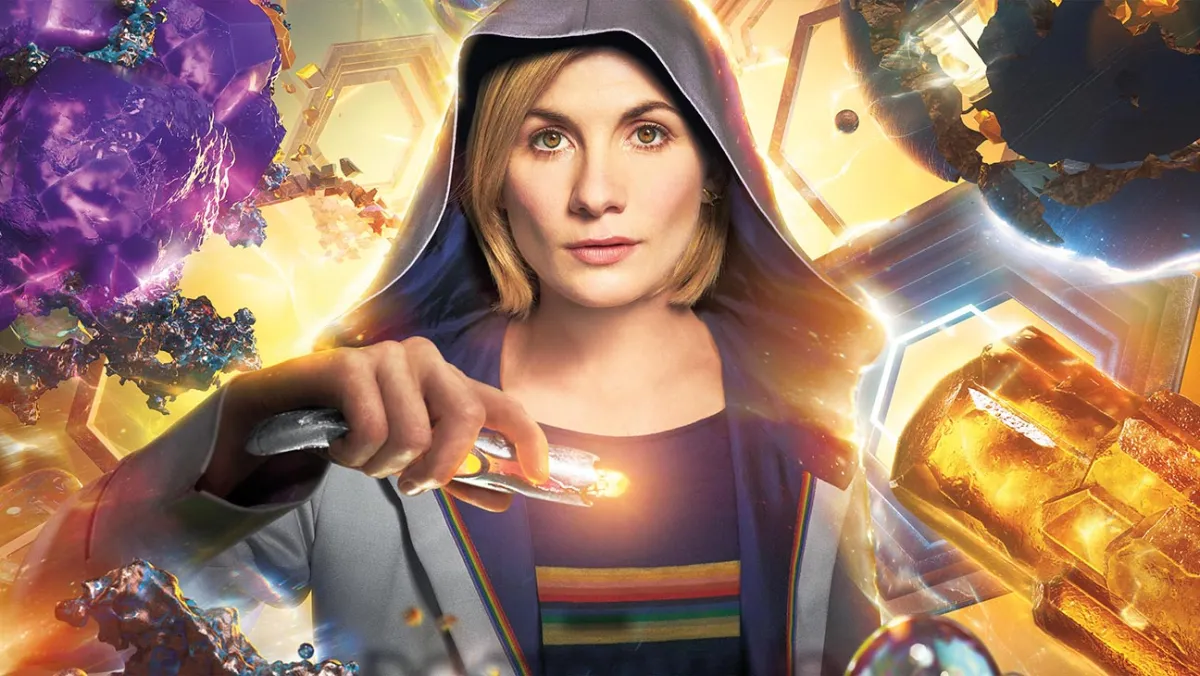The BBC announced this week that lead actor Jodie Whittaker and creator Chris Chibnall would both be departing Doctor Who following this year’s season and two specials to be broadcast in 2022.
The announcement came only days after the BBC took the show to Comic-Con, launching the trailer for the duo’s third season together and announcing the six episodes would form a single narrative arc. Although various internet publications have turned rumors of Whittaker and/or Chibnall’s departure into a miniature cottage industry, Whittaker had stated that “to even question an end point [of Doctor Who] would be too upsetting” as recently as November 2020.
On the one hand, it is somewhat surprising that both Whittaker and Chibnall should depart the show simultaneously. After all, Chibnall’s two direct predecessors – Russell T. Davies and Steven Moffat – both served as showrunners on Doctor Who long enough to oversee two lead actors playing the part of the Doctor. However, the announcement makes it clear that Whittaker and Chibnall were a package deal, with Chibnall claiming the duo “made a ‘three series and out’ pact with each other.”
This announcement raises interesting questions about the show’s future. The announcement confirms that Jodie Whittaker will depart in a feature-length episode in 2022 that will coincide with centenary celebrations for the BBC. However, this means that Doctor Who will enter its 60th anniversary year with no established lead and no established showrunner. Given that the show has taken gap years before, it’s entirely possible that no Doctor Who could air in its anniversary year.

There are likely already forces in motion behind the scenes. Chibnall’s direct predecessor Steven Moffat postponed his departure from the show until a replacement had been found because he didn’t want to “leave it in the lurch.” Even after Chibnall was announced, Moffat produced an entire season with Chibnall “getting every draft of every script” to prepare him. He even produced a last-minute Christmas special to allow the series to hold on to that prime piece of scheduling real estate.
It seems fair to assume Chibnall would be as considerate. However, the future of Doctor Who is a matter to discuss at another time. The simultaneous departure of Chibnall and Whittaker provides an opportunity for reflection. Obviously, the two are not entirely finished. The six episodes that compose the new season have yet to broadcast, and the two specials that will wrap up their tenure have yet to be produced. The curtains haven’t been completely drawn down on this era of the show.
Still, it seems highly unlikely that this era of the show will radically and dramatically change direction in its final stretch, particularly given that the pandemic caused Chibnall to scale back on his plans for his third season. In November 2020, it was announced that the episode count had been cut from the planned 11 to eight. With the announcement of Chibnall’s departure, it was revealed that the count of eight was six episodes in the season itself and two specials the following year.
Chibnall’s tenure has not been universally praised. Such things are obviously subjective, but there is a trend. At The A.V. Club, the 22 episodes of the Chibnall era so far average out to a B grade, marking a significant decline from the A grade average of the collaborations between Moffat and actor Peter Capaldi. At Rotten Tomatoes, the 78% critics rating for the most recent season marks an appreciable slump from the 88%, 90% and 88% scores for the three Moffat and Capaldi seasons.

There is some sense that audiences have a similar sentiment. The BBC uses a method of audience polling known as the “appreciation index” (AI) to grade viewers’ response to what they are watching. During Davies’ and Moffat’s combined 12 years running Doctor Who, only four episodes received an AI score below 80 — three during Davies’ tenure, one during Moffat’s. In contrast, seven of the 22 episodes produced by Chibnall have dropped below that watermark.
Since the revival of Doctor Who, no lead actor has carried across the transition from one showrunner to the next. It has been customary for showrunners to clear the decks. Davies departed with Tennant and Moffat left with Capaldi. However, the fact that the showrunners in question worked with multiple lead actors has allowed those actors a distinct stamp on the show. Moffat’s three seasons with Matt Smith are appreciably different in tone and style than his three seasons with Capaldi.
The simultaneous departure of Chibnall and Whittaker tethers the actor and showrunner to one another. Whittaker’s work on the show becomes inseparable from Chibnall’s vision of Doctor Who. This does Whittaker something of a disservice. After all, she is among the best British actors working. There was a genuine and palpable excitement around her casting in the lead role. It’s hard not to be moved by the reactions that younger fans in particular have had to Whittaker.
Unfortunately, the show never lived up to Whittaker’s potential. Previous iterations of Doctor Who treated the lead character as a dynamic and compelling force, but Chibnall’s version of Doctor Who forced the character into a more passive role. Chibnall’s approach to the Doctor is one of the most conservative in the show’s history. Notably, her second season finale involved extended sequences of the character frozen in place as multiple characters monologue exposition about her to her.

Whittaker has perhaps gotten to do her best work as the Doctor outside the confines of Doctor Who. She remains an infectiously enthusiastic ambassador for the show. Her best work in the role might be the short videos that she filmed in character early in the pandemic, aimed at helping younger fans to cope with the chaos unfolding around them. Chibnall was undoubtedly a part of those videos, but Whittaker flourishes outside the confines of the show’s narrative.
There is a huge gulf between the potential of Whittaker’s take on the character, manifested enthusiastically in fan art and cosplay, and the reality of what has been realized on screen. As such, this marks a point of delineation in the modern history of Doctor Who. Whittaker’s departure will be the first time in the history of the revival that an iteration of the lead character will need a post hoc redemption and rehabilitation. Luckily, the moment has been prepared for.
Whittaker is not the first actor to have a bumpy tenure in the TARDIS. Colin Baker had a turbulent time playing the Sixth Doctor. Baker famously (and perhaps hubristically) boasted he wanted “to have a tilt” at the record for show’s longest-serving lead actor. Baker was saddled with a terrible costume and worse characterization. After his first year, the show was put on hiatus. After his second year, he was fired. He became the show’s shortest-serving lead actor to that point.
However, Baker’s approach to the character was gradually and slowly redeemed through ancillary media. The Sixth Doctor was reimagined and reinvented in various tie-in novels and audio plays. Colin Baker was allowed to give a more nuanced performance that played to his strengths. The character even got a less garish costume, as if his rainbow coat were too loud to work even in a non-visual medium. This is one of the benefits of supplemental Doctor Who media.

The production team understands the value of these sorts of spin-offs. When Davies took over Doctor Who, he made a point to ensure that companies like Big Finish could continue to produce tie-in material. Davies famously offered to let the official comic strip depict the off-screen regeneration from Paul McGann into Christopher Eccleston. Many key creative forces in the revival – including Davies and Moffat themselves – worked on Doctor Who tie-ins while the show was off the air.
These sorts of projects provided fertile ground for Doctor Who to grow and evolve in the years following the cancellation of the original series. It provided a space to develop characters who had struggled to find their footing on the television show. It continues to serve this function to this day. The licensed spin-off media has already caught up with the revival, with actors like Christopher Eccleston, David Tennant, Billie Piper, and Catherine Tate reprising their roles in audio plays.
It is possible to imagine Whittaker returning to the role in that format in a couple of years, performing the role outside the confines of Chris Chibnall’s vision of Doctor Who. Even if Whittaker herself does not return, there will be countless opportunities to reinvent and reconfigure the Thirteenth Doctor. As fans of the character and the era come of age, they will inevitably work on books and comics, perhaps finding an angle on the character that satisfies Whittaker’s potential.
Still, as the sun begins to set on Whittaker and Chibnall’s collaboration on Doctor Who, it’s hard not to reflect on the era as one that is already waiting for its redemption and rehabilitation.






Published: Jul 31, 2021 11:00 am